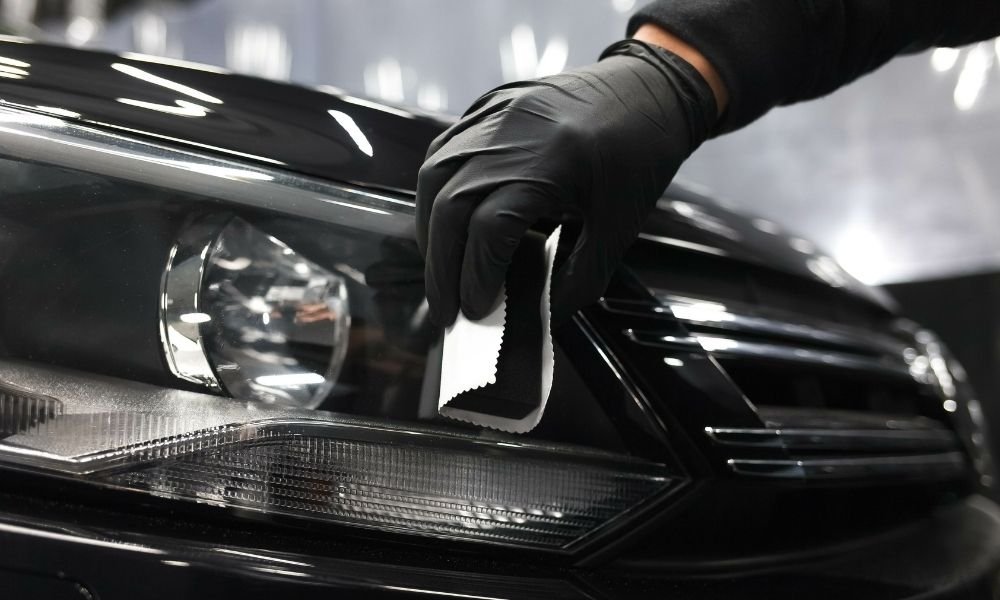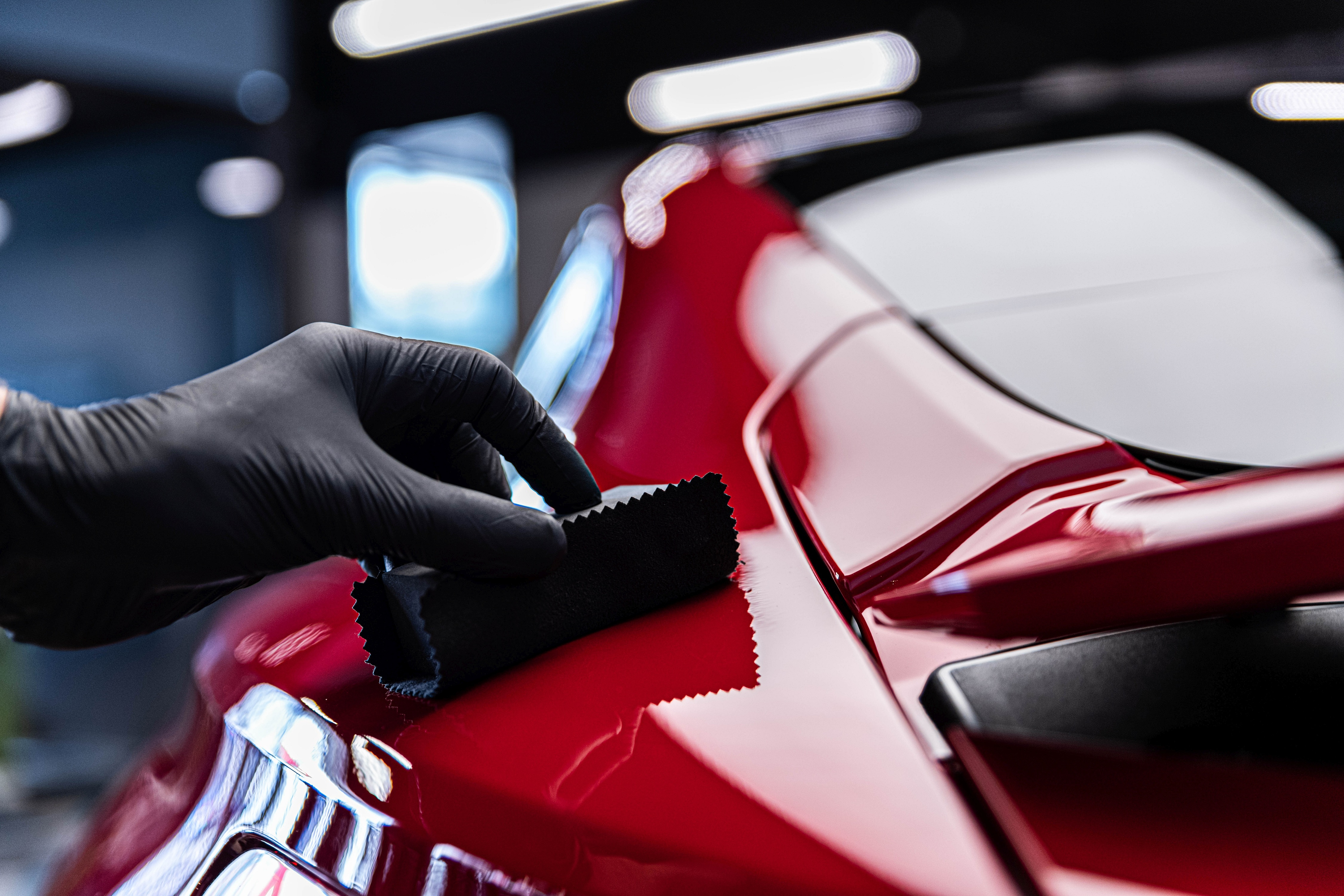Final Touch Auto Works Ceramic Coatings Application Checklist for DIY Enthusiasts
Final Touch Auto Works Ceramic Coatings Application Checklist for DIY Enthusiasts
Blog Article
The Ultimate Guide to Ceramic Coatings: Enhancing Your Automobile's Complete and Sturdiness
Ceramic layers could be the option you've been looking for if you're looking to raise your automobile's look and protection. These sophisticated coverings bond with your car's paint, producing a sturdy barrier versus environmental damage. But how do they pile up versus typical wax? Understanding the benefits and application process can make a substantial difference in your cars and truck treatment regimen. Allow's discover what makes ceramic layers a worthwhile investment for your vehicle.
What Are Ceramic Coatings?
Ceramic finishes are advanced safety layers that boost your automobile's exterior. They're made from a liquid polymer that chemically bonds with your car's paint, developing a long lasting shield. Unlike typical wax or sealers, which diminish gradually, ceramic coverings provide long-lasting defense versus ecological pollutants like UV rays, dirt, and chemicals.When you use a ceramic layer, you're investing in a barrier that drives away water, making it easier to cleanse your car and keeping it looking more recent for longer. This innovation aids maintain the stability of your paint, reducing the threat of scrapes and oxidation.Ceramic coatings come in various formulations, each designed to accommodate various demands and preferences. You can pick a do it yourself set or opt for specialist application, depending upon your comfort level and budget plan. Generally, ceramic coverings stand for an advanced remedy for keeping your car's aesthetic charm and durability.
Benefits of Ceramic Coatings
You reveal a variety of benefits that go beyond mere aesthetic appeals when you invest in a ceramic finish. To start with, it offers exceptional protection against environmental impurities like dust, bird droppings, and UV rays, maintaining your car's paint looking brand-new much longer. You'll notice that maintenance becomes less complicated, as the hydrophobic buildings cause water and grime to glide off easily. This implies less time invested cleaning and detailing your vehicle.Additionally, ceramic finishings can enhance the glossiness of your automobile's coating, offering it that showroom shine. They likewise provide resistance to scrapes and swirl marks, which helps maintain your lorry's resale value. With a ceramic covering, you're not just safeguarding your financial investment; you're also enhancing its total look and longevity. Inevitably, this advanced technology guarantees your cars and truck stands out while taking pleasure in long-lasting advantages that conventional waxes merely can not match.
The Application Refine: How to Use Ceramic Coatings
Using a ceramic covering involves a number of key steps to assure ideal results. Completely wash your automobile to remove any dirt, grime, or impurities. This ensures the surface is ready and tidy for the layer. Next off, decontaminate the paint using a clay bar to eliminate ingrained fragments. Afterward, examine the paint for imperfections and brighten it to attain a smooth surface.Once your cars and truck's surface is prepped, use the ceramic finish in little sections. Make use of an applicator pad to spread the layer equally, complying with the producer's guidelines. Enable the covering to cure for the advised time, commonly in between one to two hours, relying on the product.Finally, prevent cleaning your cars and truck for a minimum of a week to allow the finish bond correctly. Adhering to these steps will certainly assist you achieve a sturdy, high-gloss surface that shields your automobile for years to find.

Contrasting Ceramic Coatings to Traditional Wax
After guaranteeing your auto's surface area is completely prepped with a ceramic covering, it's time to contemplate just how this modern-day service piles up against standard wax. Ceramic coverings supply a durable layer of protection that lasts for several years, while wax generally uses just a couple of weeks of sparkle. You'll observe that ceramic coatings bond with your paint, developing a hydrophobic surface that pushes back water and dust, making maintenance easier.In contrast, conventional wax rests on top of the paint and calls for frequent reapplication. With ceramic finishes, you obtain superior scratch resistance and UV defense, assisting to stop fading and oxidation. While the first investment for a ceramic covering is greater, the long-term advantages often outweigh the expenses. If you're looking for toughness and improved gloss, ceramic finishes are a clever choice over traditional wax.
Maintenance Tips for Your Ceramic Coated Car
To keep your ceramic-coated car looking excellent, normal upkeep is essential. Start with a mild clean making use of a pH-balanced hair shampoo; avoid severe detergents that can deteriorate the covering. Use a microfiber wash glove to avoid scratches and always rinse thoroughly to get rid of any kind of soap residue.After cleaning, completely dry your car with a soft microfiber towel to avoid water places. Take into consideration using a ceramic maintenance spray every couple of months to boost the coating's hydrophobic residential or commercial properties and add an added layer of protection.It's also smart to avoid automatic cars and truck washes with unpleasant brushes, as they can damage the finishing. Instead, select hand cleans or touchless laundry options. In addition, consistently check your vehicle for pollutants like tree sap or bird droppings and address them without delay to avoid etching. Complying with these tips will certainly help maintain the sparkle and toughness of your ceramic-coated car for several years to come.
Usual Myths Regarding Ceramic Coatings
Despite the remarkable benefits of ceramic layers, a number of misconceptions can create complication for auto owners. One typical misunderstanding is that ceramic finishings eliminate the requirement for maintenance. While they do use improved protection, normal washing and treatment are still crucial to maintain that high-gloss finish.Another misconception is that these finishings are scratch-proof. While they provide a solid layer of protection versus minor scrapes, they can not endure severe effects or unpleasant materials.Many likewise think that ceramic finishes will make their vehicles unsusceptible to all pollutants. Actually, they drive away dust and water yet won't avoid concerns like bird droppings or tree sap from causing damage if left unattended.Lastly, some believe that applying ceramic coatings is a DIY job anyone can deal with, yet attaining a flawless application usually requires professional proficiency to ensure peak results.
Selecting the Right Porcelain Coating for Your Cars and truck
Exactly how do you pick the right ceramic finish for your vehicle? Beginning by considering the degree of defense you need. If your cars and truck deals with rough weather condition or frequent trip, opt for a premium coating that provides premium resilience and resistance to scratches, UV rays, and chemical stains.Next, consider the application technique. Some finishings require specialist installation, while others are Home Page DIY-friendly. If you're experienced, a DIY product might conserve you cash, but also for the very best outcomes, an expert can guarantee correct application.Don' t neglect to examine the long life linked here of the coating. Some last a few years, while others can shield for a years or more. Finally, check out testimonies and testimonials to determine user satisfaction. By weighing these aspects, you'll discover a ceramic coating that not just improves your auto's appearance however also gives long-lasting defense.
Frequently Asked Questions
How Much Time Do Ceramic Coatings Last usually?
Ceramic coverings generally last anywhere from 2 to five years, depending on aspects like application, maintenance, and ecological problems. You'll desire to comply with proper treatment routines to maximize their longevity and efficiency.
Can Ceramic Coatings Be Applied Over Paint Scratches?
You can not use ceramic finishes over paint scrapes properly. It's best to fix any scrapes initially, making certain a smooth surface area - Final Touch Auto Works Ceramic Coatings. In this manner, the coating bonds effectively and provides ideal defense for your automobile's finish
Are Ceramic Coatings Safe for All Vehicle Surface areas?
Ceramic finishes are normally risk-free for most cars and truck surface areas, consisting of paint, glass, and wheels. Nonetheless, it is critical to examine specific item standards, as some layers might not be ideal for sure materials or coatings.

Will Porcelain Coatings Protect Versus UV Damage?

Can I Do Touch-Ups on Ceramic Coated Surfaces?
You can do touch-ups on ceramic layered surfaces, however it's essential to utilize suitable products. Validate the area is clean and follow appropriate application techniques to look at these guys preserve the finish's stability and efficiency. Unlike conventional wax or sealants, which wear off over time, ceramic layers supply lasting defense versus environmental contaminants like UV rays, dust, and chemicals.When you apply a ceramic coating, you're investing in an obstacle that pushes back water, making it simpler to clean your vehicle and maintaining it looking newer for longer (Final Touch Auto Works Ceramic Coatings). Afterward, examine the paint for flaws and brighten it to attain a smooth surface.Once your cars and truck's surface area is prepped, use the ceramic finish in small sections. Allow the layer to treat for the recommended time, generally in between one to 2 hours, depending on the product.Finally, stay clear of washing your cars and truck for at least a week to allow the layer bond correctly. Consider applying a ceramic maintenance spray every few months to boost the coating's hydrophobic properties and add an added layer of protection.It's likewise sensible to stay clear of automated car washes with rough brushes, as they can harm the layer. Ceramic finishes are normally safe for most cars and truck surfaces, including paint, glass, and wheels
Report this page